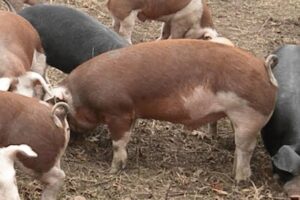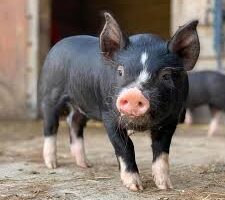The American Guinea Hog is a unique and heritage breed of pig that has captured the hearts of farmers and homesteaders across the United States. Known for its hardiness, adaptability, and gentle temperament, this breed is a great addition to sustainable farming practices and backyard operations. In this article, we will explore the history, characteristics, benefits, and care of the American Guinea Hog, emphasizing its significance in modern agriculture.
Read about Tamworth Pigs
History of the American Guinea Hog
The American Guinea Hog originated in the southeastern United States in the early 19th century. It is believed to have descended from pigs brought over by African slaves and local breeds, creating a distinctive lineage that thrived in the region’s climate. By the late 1800s, these pigs were recognized for their utility on farms, serving as efficient foragers and excellent producers of meat.
However, like many heritage breeds, the American Guinea Hog faced decline due to the industrialization of agriculture. By the mid-20th century, they were nearly extinct, with only a few hundred left. Conservation efforts began in the 1990s, and thanks to dedicated breeders and enthusiasts, the population has steadily increased.
Characteristics of the American Guinea Hog
The American Guinea Hog is a small to medium-sized breed, typically weighing between 100 to 300 pounds. They have a unique appearance characterized by:
Color: They are predominantly black but can also have a few white spots.
Body Shape: Their bodies are compact and low to the ground, with short legs and a broad back.
Temperament: Known for their friendly and docile nature, they are great companions and can be easily handled.
These pigs are known for their excellent foraging ability, thriving on pasture and foraging for nuts, roots, and grasses, making them ideal for sustainable farming practices.
Benefits of Raising American Guinea Hogs
Sustainable Farming: American Guinea Hogs are excellent foragers, requiring less grain and feed than commercial breeds. This characteristic makes them environmentally friendly and cost-effective for small farms.
Quality Meat: The meat from American Guinea Hogs is prized for its rich flavor and marbling. Their slower growth rate results in a more flavorful and tender product, appealing to gourmet chefs and local food markets.
Adaptability: These pigs can thrive in various climates and environments, making them suitable for different farming conditions. Their hardiness means they require less intensive care compared to other breeds.
Heritage and Conservation: By raising American Guinea Hogs, farmers contribute to the preservation of this endangered breed, promoting biodiversity and heritage in livestock farming.
Caring for American Guinea Hogs
Caring for American Guinea Hogs is relatively straightforward, as they are hardy animals. Here are some essential care tips:
Housing: Provide a clean and dry shelter that protects them from extreme weather. Ensure adequate ventilation and space for them to move comfortably.
Diet: While they can forage, supplement their diet with high-quality pig feed and fresh water. This will ensure they receive all necessary nutrients.
Health Care: Regular veterinary check-ups, vaccinations, and deworming are essential for maintaining their health. Monitor them for signs of illness and address any concerns promptly.
Social Interaction: American Guinea Hogs are social animals and thrive in groups. Keeping them in pairs or small groups will help them remain happy and healthy.
Conclusion
The American Guinea Hog is more than just a livestock breed; it embodies a rich history and a commitment to sustainable farming practices. With its adaptability, gentle temperament, and high-quality meat, it is an excellent choice for small farms and homesteads. By choosing to raise this heritage breed, farmers contribute to the preservation of agricultural diversity and the promotion of responsible farming. If you’re considering adding pigs to your farm or homestead, the American Guinea Hog deserves your consideration.
FAQs About American Guinea Hogs
Are American Guinea Hogs good for beginners?
Yes, their gentle temperament and easy care requirements make them a great choice for beginners in pig farming.
How much space do American Guinea Hogs need?
Ideally, they should have access to at least a quarter acre for foraging and roaming, but they can thrive in smaller spaces if managed properly.
What do American Guinea Hogs eat?
They can forage for a significant portion of their diet, but they should also receive a balanced pig feed and fresh water.
How do I find American Guinea Hogs for sale?
Look for reputable breeders, rescue organizations, or heritage breed associations that specialize in American Guinea Hogs.
By embracing the American Guinea Hog, farmers and homesteaders can enjoy the benefits of a unique and sustainable livestock option while contributing to the conservation of an important heritage breed.






